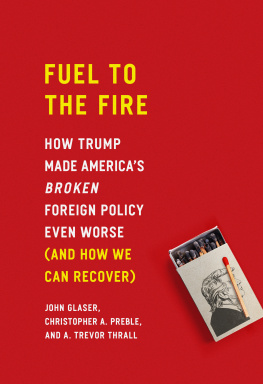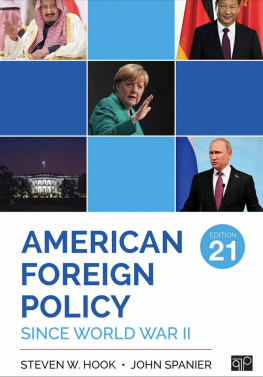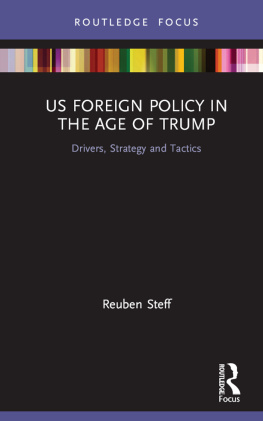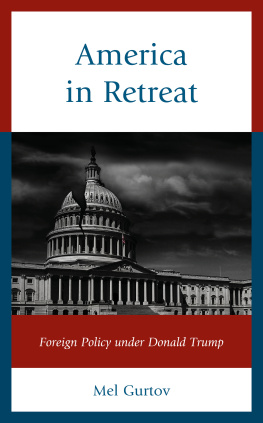Praise for Fuel to the Fire
In light of President Donald Trumps aspirational (and contradictory) tweet-nouncements, this book provides a road map for citizens and scholars to understand the direction of actual U.S. foreign policy. An impressive work of sensemaking in an era of unusual uncertainty.
Micah Zenko, national security scholar and coauthor of Clear and Present Safety: The World Has Never Been Better and Why That Matters to Americans
Reading this book wont cheer you up, but it will make you smarter. Fuel to the Fire is a comprehensive and dispassionate account of Donald Trumps failing foreign policy, and it points the way toward a more effective grand strategy. Trump ran for office pledging to rein in U.S. global commitments, but as president he has repeated most of his predecessors errors while adding new ones of his own. Americans want a more restrained and successful foreign policy, but this clear-eyed, hard-hitting book explains why Donald Trump is not providing it.
Stephen M. Walt, Robert and Rene Belfer Professor of International Affairs at Harvard Universitys John F. Kennedy School of Government
At a time when American foreign policy is badly in need of a reboot, this provocative, powerfully argued call to move past a failing insistence on militarized primacy is a welcome addition to the debate.
Ben Rhodes, deputy national security adviser to President Barack Obama, 20092017
In an age where news channels struggle to keep up with Twitter, keeping things in perspective is next to impossible. Thats why Fuel to the Fire is so critical, looking to the long-term implications of Americas ailing approach to foreign policy and offering necessary policy prescriptions to set things back on track. A book for our current times and beyond.
Ian Bremmer, Eurasia Group and GZERO Media
Fuel to the Fire is an excellent analysis of contemporary U.S. foreign policy. Glaser, Preble, and Thrall explain how Donald Trump has made existing policies worse while introducing harmful changes of his own. They make a persuasive case that Trumps foreign policy is so destructive because it pursues the same strategy of primacy as his predecessors, but with less competence and fewer constraints.
They do a great service in identifying the core of Trumps worldview and understanding how that affects his foreign policy decisions. Their most important contribution is their argument for a strategy of restraint that guards against primacys excesses and failures. It is essential reading for everyone who wants to understand why our foreign policy has failed Americans so badly and what can be done to fix it.
Daniel Larison, senior editor, The American Conservative
As scholars, students, and practitioners debate the legacy of American primacy and the virtues of a more restrained U.S. foreign policy, Fuel to the Fire should jump to the top of their reading list. Arguing that the younger generation correctly favors strong international engagement through trade and diplomacy while eschewing military intervention, the authors argue for a new grand strategy they believe will prove less costly for American interests and will enable a rules-based international system to flourish. The authors deep expertise and engaging writing style make this book a must-read as Americans assess their past, present, and future foreign policy.
James Goldgeier, American University
FUEL TO THE FIRE
FUEL TO THE FIRE
HOW TRUMP MADE AMERICAS BROKEN FOREIGN POLICY EVEN WORSE (AND HOW WE CAN RECOVER)
JOHN GLASER, CHRISTOPHER A. PREBLE, AND A. TREVOR THRALL
Copyright 2019 by the Cato Institute.
All rights reserved.
Print ISBN: 978-1-948647-46-5
eBook ISBN: 978-1-948647-47-2
Library of Congress Cataloging-in-Publication Data available.
Cover design: Derek Thornton, Faceout Studio
Cover illustration: Mike Trukhachev / Shutterstock.com
Printed in Canada.
CATO INSTITUTE
1000 Massachusetts Avenue, NW
Washington, DC 20001
www.cato.org
CONTENTS
ACKNOWLEDGMENTS
We are grateful to the editors at Cato Books, especially Jason Kuznicki and Eleanor OConnor, and to our many Cato colleagues for their help. We received research help from a number of Cato research assistants and interns, including Jonathan J.E. Allen, James Knupp, Courtney Nadeau, Madison Parkhill, and Lauren Sander. Thanks to Roshni Ashar for her help with the many charts and graphs and to Karen Coda and Karen Ingebretsen of Publications Professionals LLC for copyediting.
INTRODUCTION
There is no Trump doctrine. So said Mike Dubke, President Donald Trumps communications director in the early months of Trumps presidency. The comment, offered in private during an internal White House staff meeting about how to brand Trumps foreign policy during his first 100 days in office, was perhaps more perceptive than its utterer appreciated at the time.
To many, Donald Trumps rise in the Republican primaries and eventually to the presidency represented an astonishing break with the Washington, DC, foreign policy consensus that had prevailed from Harry Truman to Barack Obama. The broad pillars of postWorld War II U.S. grand strategy, pursued with remarkable continuity from 1945 to 2016, prescribed an international order made dependent on U.S. military predominance. Washington extended security commitments to scores of allies and client states and deployed a permanent globe-straddling forward military presence. It installed itself as leader of the major political and economic international institutions established after World War II and relied on the frequent threat and use of force in pursuit of a wide range of perceived national interests, not merely to protect Americas physical security. The foreign policy preferences of candidate Trump, many argued, were a radical departure from these long-standing grand strategic imperatives.
I think NATO is obsolete, Trump said in an interview with ABC News in March 2016, roughly two months before he would secure the nomination of the Republican Party. The North Atlantic Treaty Organization (NATO), a security alliance established in the early years of the Cold War to contain Soviet influence in Europe, had until this moment been an unassailable element of bipartisan foreign policy doctrine. It obligates member nations to treat an attack on any member as an attack on them all. When the Soviet Union collapsed in 1991, the United States kept the alliance in place and later expanded it to the far eastern reaches of Europe. NATO has come to represent much more than a defensive security alliance. Washington largely sees it as the fulcrum of peace in Europe and an institutional model for promoting democracy, extending economic integration, and allowing the United States to maintain its leadership of the so-called liberal international order.
Trumps dismissal of NATO as obsolete in a world without the Soviet Union was consistent with his expressed frustration with allies free riding on U.S. protection. We are being ripped off by everybody, Trump said in October 2016. We have to renegotiate these agreements, because our country cannot afford to defend Saudi Arabia, Japan, Germany, South Korea, and many other places. In addition, candidate Trump spoke somewhat cavalierly of the prospect of nuclear weapons proliferation in South Korea and Japan, countries that had abstained from building their own nuclear deterrents thanks in part to American security guarantees. This position also sharply deviated from the foreign policy consensus in Washington, DC, which understands the U.S.-led international security architecturecentered on U.S. security commitments and extended deterrenceas a vital and incontestable American responsibility.








